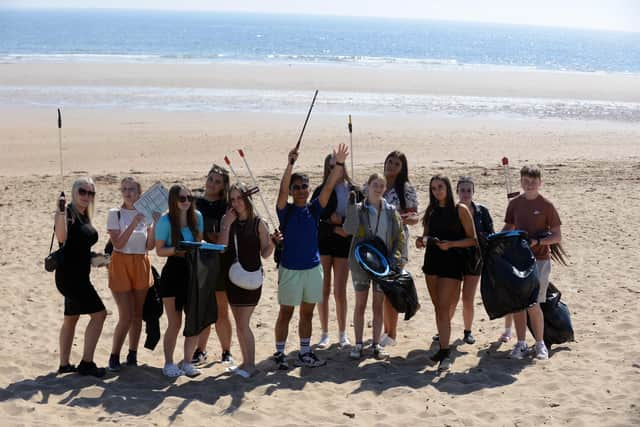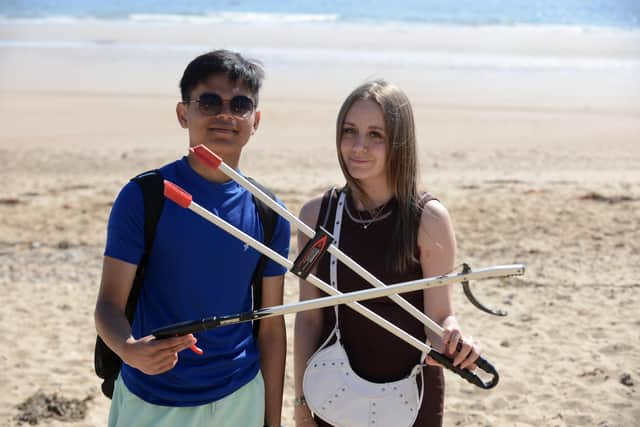Watch as teenagers carry out mass clean up of Sunderland's Roker Beach with vapes, beer cans and broken glass found
and live on Freeview channel 276
Plastic cups and bottles, glass, beer cans, bbq trays, baby wipes, vapes, and fishing line were just some of discarded items cleared up by 150 teenagers from Sunderland College who were cleaning up other people’s mess from Roker beach.
Students from all different subject areas were looking to “give something back” to the local community as part of the Good For Me Good For FE national programme to promote local sustainable action.
Advertisement
Hide AdAdvertisement
Hide AdIn addition to making the beaches safe and clean for people and wildlife, they were also recording what they found as part of a national research project for the Marine Conservation Society to help ascertain the volume and type of waste being left by beach goers.
Art students also used some of the rubbish collected to create beach art as a visual way of highlighting the type of items being discarded and to promote recycling.


Travel and Tourism student, Kaden Mountin, 17, said: “I’ve found pieces of glass which are dangerous for people and animals as well as plastics which can end up in the sea and be harmful to marine life.”
Classmate Nino Sales, 16, added: “I always put my rubbish in the bin, but not everyone does. No one wants to see rubbish on the beach and by cleaning it up, hopefully it will also make the community feel better and people will want to come to the beach.”
Advertisement
Hide AdAdvertisement
Hide Ad

Sadly, the items found came as no surprise to Ian Graham, who works as the Coast Project officer for Sunderland City Council, and was helping to coordinate the clean-up event.
Ian, 64, said: “Litter is being left behind by tourists and beach goers. Plastics are the biggest concern as they can have a big impact on the wildlife which can ingest it or become entangled in it.
“When a seabird sees something shiny on the surface of the sea it will dive down and possibly consume it, thinking it’s a fish.”
“The students are also carrying out vital research about the items being left behind which can be used to get the message out there about what’s happening and the importance of keeping our beaches clean.”
Advertisement
Hide AdAdvertisement
Hide AdIt’s a sentiment shared by Wild Sea Women founder, Hayley Dorion, who knows more than most about the amount of rubbish ending up in the North Sea and was at Roker beach to help with the clean up.
Hayley, 45, said: “In the summer, following gatherings on the beach, the next morning we will come down to the and find the sand covered in litter. There’s alcohol bottles, crisp packets, plastic children’s toys and take away food packaging.
“People just think the sea takes it away and that’s it, it’s gone, but animals are eating it and becoming tangled up in it.
“It’s amazing to see the young people here today taking part in this beach clean and to develop an understanding of why we are doing this.
Advertisement
Hide AdAdvertisement
Hide Ad“The beach is for everyone to enjoy and people need to take responsibility and either take their rubbish home or put it in the bin.”
Sunderland College is part of the Education Partnership North East along with Northumberland College and Hartlepool Sixth Form, who were carrying out beach cleans at Newbiggin-by-the-Sea and Seaton Carew.
Project coordinator and Director of Commercial Industries at Sunderland College, Kellie Campbell, said: “Young people are often blamed for things like leaving litter and so it’s good for them to give something back and for people to see them doing something positive in the community.
“Seeing all the items collected helps them to develop an understanding of how they can pose a hazard to people and wildlife.”
Comment Guidelines
National World encourages reader discussion on our stories. User feedback, insights and back-and-forth exchanges add a rich layer of context to reporting. Please review our Community Guidelines before commenting.